Tribocorrosion Fundamentals, Methods, and Materials
Coordonnateurs : Siddaiah Arpith, Ramachandran Rahul, Menezes Pradeep

2. Experimental investigation of tribocorrosion
3. Electrochemical Methods in Tribocorrosion
4. Tribocorrosion mechanisms in sliding contacts
5. Tribocorrosion aspects of implant coatings: hip replacements
6. Tribocorrosion of hard coatings and thin films
7. Importance of in-vitro assessment of total hip arthroplasty (THA) using Hip simulator and preliminary results
8. Computational Methods in Tribocorrosion
Dr. Ramachandran received his Ph.D. in mechanical engineering from the University of Wisconsin-Milwaukee. During his Ph.D. he worked on engineering and applications of hydrophobic and icephobic materials. He currently teaches courses on computer methods for engineers, dynamics, and heat transfer. His research interests include surface engineering, wetting, adhesion, and hydrophobic and icephobic materials.
Dr. Pradeep L. Menezes is an Associate Professor in the Department of Mechanical Engineering at the University of Nevada, USA. Before joining this university, he worked as an Adjunct Assistant Professor at the University of Wisconsin–Milwaukee (UWM), and as a Research Assistant Professor at the University of Pittsburgh. Dr. Menezes’s productive research career has produced more than several peer-reviewed journal publications book chapters, books related to tribology and a patent. He teaches Introduction to Tribology, Advanced Tribology, Surface Engineering, Introduction to Manufacturing Processes, Mechanical Design, and Engineering Composites. He participated in many national and international conferences in roles such as conference paper reviewer, conference review committee member, conference technical committee member, session chairman, Paper Solicitation Chair and technical session organizer.
- Provides a complete overview of tribocorrosion testing, experimentation and modeling methods that in turn empower safer, environmentally-friendlier and cost-saving applications
- Balances experimental and computational methods, thus encouraging readers to define and develop experimental and investigative techniques specific to their tribo-system of interest
- Covers tribocorrosion behavior in passive and non-passive metals and alloys, coatings, modified surfaces, metal matrix composites, and more
Date de parution : 05-2021
Ouvrage de 232 p.
15x22.8 cm
Thèmes de Tribocorrosion :
Mots-clés :
?Abrasion; Acetabular; Adhesion; Coatings; Computational modeling; Corrosion; Corrosion current density; Corrosive wear; CrN; DLC; Delamination; Electrochemistry; Erosion; Galvanic coupling; Hip joint wear test; Impact; In situ; Materials tribology; Measurement; Mechanisms; Mechanistic models; Modifications; OCP; Open circuit potential; PVD; Passivating metals; Passivity and its breakdown; Pitting potential; Sliding; Surface coatings; Temperature; Thin films; TiN; Tribocorrosion; UHMWPE; Wear; Wear studies; Wear-corrosion synergisms; Wear-corrosion synergy



